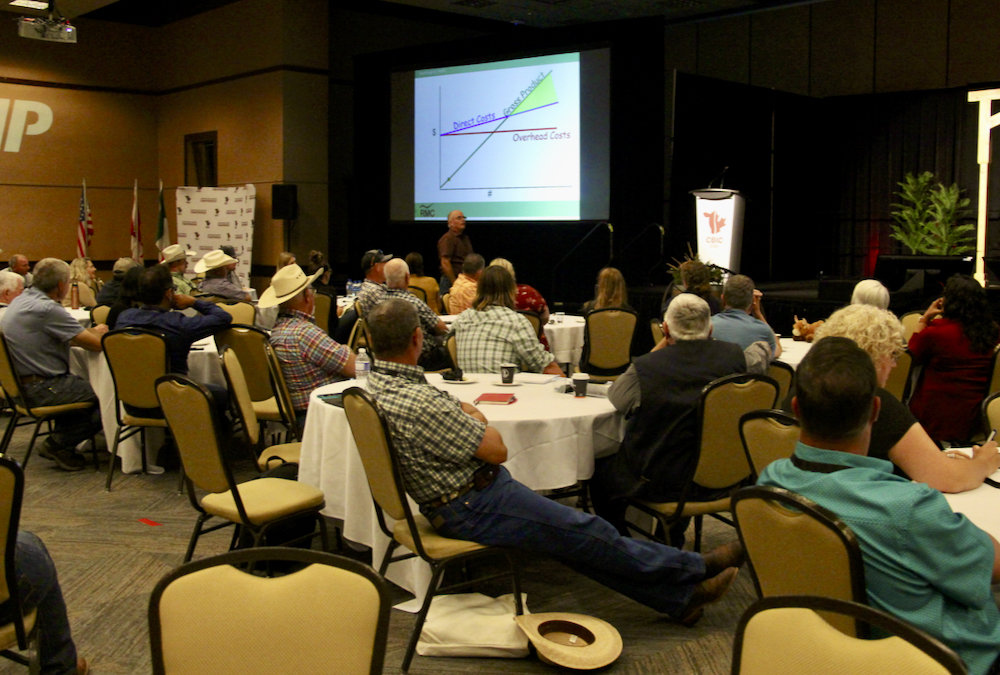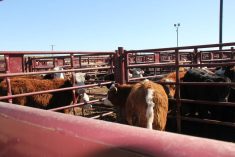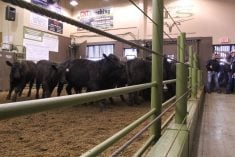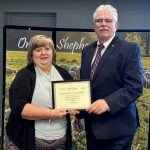In 2014, Brett McRae was looking for mentorship as he worked to grow his ranch, located near Brandon, Man. He was picked as a mentee for the Canadian Cattle Young Leaders Mentorship Program and told his mentor what he was looking to do with his ranch and how he wanted to expand and change.
His mentor told him Ranching for Profit was the way to go.
“It was a no-brainer,” McRae says.
Read Also
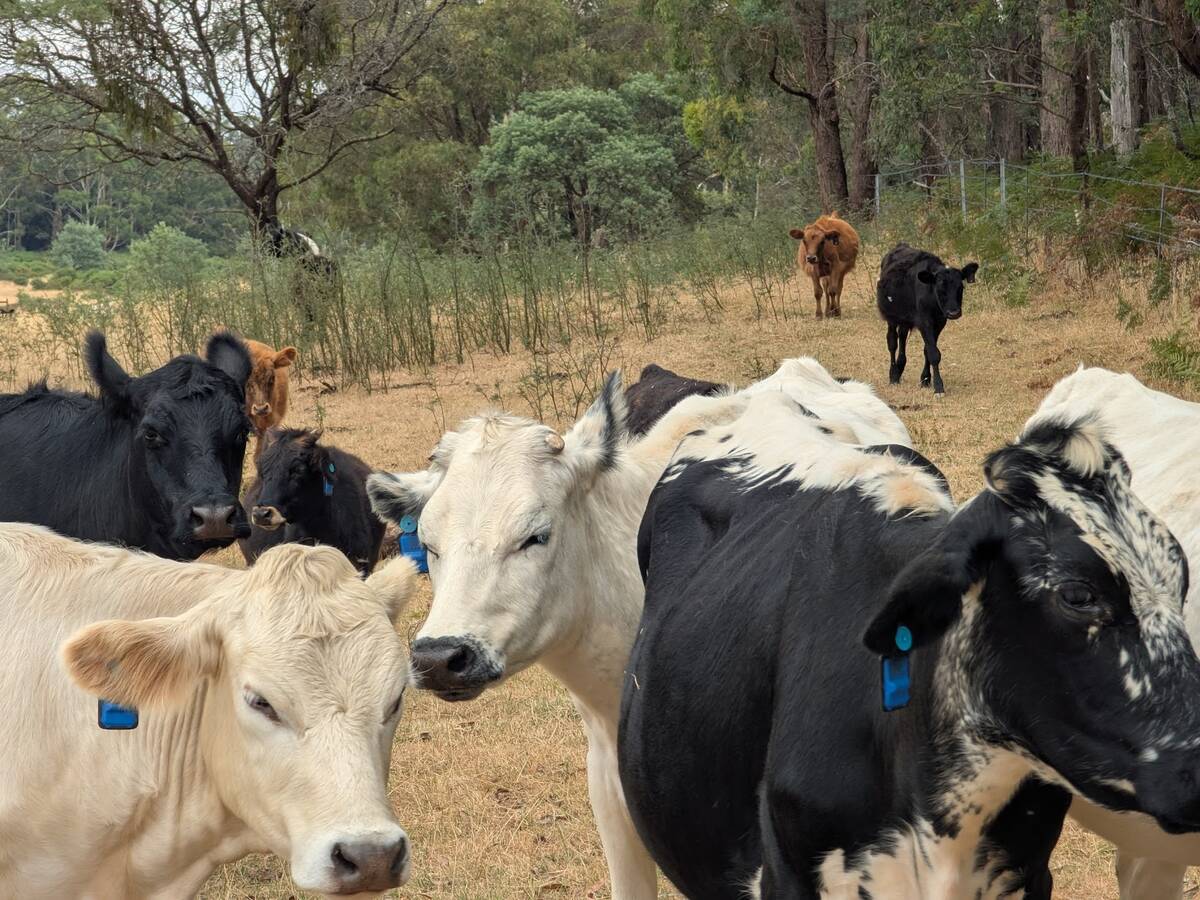
Australian company brings ear-tag tech to Canadian pastures
With Smart Paddock, beef farmers and ranchers can track their cattle through GPS technology
So, in July of 2015, McRae packed up his bags and left Brandon for Colorado Springs for a week, where he took the Ranching for Profit course for the first time.
“It’s a lot,” McRae says. “It’s a big paradigm shift … I’ve talked to other people who have taken it as well and there’s just something there when you’re immersed in that culture for a week, things just seemed to click.”
[RELATED] How to quit smart or push through using ‘the dip’
Ranching for Profit
The Ranching for Profit School, run by Ranch Management Consultants (RMC), is a program offered to producers who want to learn how to make their ranch more profitable. It’s a one-week intensive school where producers learn about economics, finance, people, ecology, grazing and production. By the end of the week, producers should have learned how to make their ranches more profitable.
Started in the early ’80s, RMC has been teaching ranchers about business for over 30 years.
“It’s based on the idea that when you grow up in ag, you get good knowing how to raise crops and raise livestock, but not necessarily knowing how to run a business,” says Dallas Mount, the current owner of RMC. “People often think, ‘Well, my cattle are good, my crops are good, so I should be successful.’ No, it doesn’t work that way.”
Mount has owned the company since 2019. Before that, he taught at the Ranching for Profit school for many years and attended it himself. He manages a cell-grazing operation near Wheatland, Wyoming.
Because the school takes place over only a week, each day can be very heavy. Mount says they usually get students to work in groups of six, where they review concepts from the previous day before they dive into a new day’s worth of material.
[RELATED] Driving profit through cattle genetics on the ranch
“It’s not very much lecture at all,” Mount says. “We still will cover a concept and then we give you an exercise to apply it at your table working with other people that are attending the school. And so you work through that exercise and apply it. We often have a class discussion around it — you know, what people’s experiences are with it. And so it’s a mix of lecture, discussion, application and then practicing it to make sure you understand the concepts.”
Retaking the school
For McRae, the intensive one-week school provided many possibilities to switch things in his business — but he had to take the school three times to really get the information down.
“I retook the course in 2019, which was too long of a wait; I probably should have taken it sooner,” McRae says. “There’s a lot, it’s a big course. Your bucket fills up pretty quick and just overflows with information. Anybody that has taken it once, go take it again, like within probably two or three years would be ideal. I got married in 2020, so then my wife and I went down to the United States together in January (2022).”

McRae says when he took the course for the second time, the instructor taught things he didn’t remember from the first time, just because of how much information there was to absorb.
“The additional times you’ve taken the course, you come out of it with other things you want to change as well,” he says.
Mount says past graduates make up about 20 per cent of every school. He repeated the school when he was a student.
“We try to pace it at a pace that’s digestible,” he says. “But the thing is, as your situation and life evolves, as things change for people, the things that we’re talking about at the school are going to resonate differently.”
Paradigm shift
At the Canadian Beef Industry Conference in Penticton, B.C., Dave Pratt, the previous owner of RMC, hosted an afternoon workshop to give conference attendees a glimpse of what the school is like.
While conducting the workshop, Pratt says that one of the biggest issues producers face is a paradigm shift on what hard work means.
“What we’re trying to do here is help people make that transition from self-employed to business owner,” he says. “It may seem like a simple little thing. It’s not. Because I’ll bet right now, you get it. Being a business owner would make sense. But it’s not the way you were raised. And your work ethic is going to get in your way.”
But Mount says that most people who come to Ranching for Profit are open-minded enough for the shift in paradigm that might happen and if they aren’t, usually by the end of the week they’ve changed their tune.
“I think just about everybody that comes to the school has some kind of a paradigm shift in the way that they look at their business,” Mount says. “To be there for seven days among people that are having deep conversations about their businesses and their lives, you have to work very hard not to have a paradigm change that week. So I would say it’s not hard at all. Probably more than 80 per cent of the people attending the school have had some kind of paradigm shift.”
CBIC workshop
Although Dave Pratt is retired, he still goes on the road for RMC when he needs to. One reason could be that he loves teaching.
So, in the middle of August 2022, Pratt found himself in hazy Penticton, B.C., doing what he loves — teaching ranchers how to turn their job into a business.
As the previous owner of RMC, Pratt has taught the Ranching for Profit school many times and done workshops such as the one at CBIC.
He spoke about the three ways to make money — as an employee, being self-employed, or as a business owner. Pratt says most ranchers are self-employed — but they can change that.
“When you’re self-employed you work for a lunatic,” Pratt says. “And the reason you work for a lunatic is because you work on the things that you’re good at and the things you enjoy doing. Sometimes these aren’t the things that need to be done. We’re so busy doing $10-an-hour jobs that sometimes we leave $100-an-hour jobs or even $1,000-an-hour jobs completely unattended. And anybody who lets their employee get away with that is a lunatic.”
He says Ranching for Profit is all about teaching people how to turn their ranch into a business so that they can have more free time.
“It’s about working less, making more and having more freedom in your life — that’s what we’re talking about. And it begins with a paradox.”
Business school
The school might be called “Ranching for Profit,” but Mount says what they truly are is a business school. This means that for producers who might run a mixed operation or who might have another business alongside ranching, the school will still apply to them.
“The secret about the Ranching for Profit school is it’s really about business management,” he says. “So even if you don’t own a single acre of ground, if you run a coffee shop in town, the things that we talked about in Ranching for Profit are going to apply to your business, that it’s business management principles. So absolutely, it applies to somebody that has cows or farms and has a mixed operation.”
Still, there are some ag-specific applications. Mount adds that, of course, a coffee shop owner is “probably not real interested in grazing management.”
Lifelong learning
The business work doesn’t stop there, though. After graduating from Ranching for Profit, graduates have the option to join another program from RMC — called Executive Link (EL).
Only for graduates of the school, EL is a program where the members are put on boards of six businesses and from there, they offer each other peer support on how to make their businesses better.
“You’re not on a board with people from the same area as you. They’re operationally diverse. So a couple of them might be cow-calf producers, a few of them might run yearlings, a few of them might run sheep, a few of them might have mixed farming operations,” says Mount.
Each board meets three times a year, Mount adds. For most of the meeting, you’re serving as an advisor to someone else’s business, but for one-sixth of the meeting, “you’re in the hot seat,” he explains.
“And we expect the boards to share their financials with each other, to talk about struggles that they’re having, opportunities that they’re considering and they look at each other’s business from a strategic standpoint.”
McRae joined Executive Link only recently, after taking Ranching for Profit for the third time last January.
“The first time I took the school I heard about the Executive Link program and I was kind of on the fence,” he says.
“We were looking for somewhere to give us accountability and confidence, to be able to bounce ideas off trusted individuals that really have your business in mind.”
However, he says after taking the school a third time, Executive Link was the best way to keep his business moving forward.
“After the first day I was like, yeah, this is absolutely where we need to be. This is where we get the confidence to know that this is the way to make the changes we need to make. And then the accountability for that, you check up with the same group of people to help you through that.”
Rancher-to-rancher advice
For anyone interested in taking the Ranching for Profit school, McRae recommends going into it ready to have your paradigms challenged.
“It’s made for anybody, whether you’re brand new to ranching or three years in. The principles are business principles no matter what, but I would say go in with an open mind and realize that everybody’s business is different. The principles are going to remain the same but how it applies to your business is going to be different.”
Ranching for Profit tuition costs around C$3,573 (US$2,750). For people who may be attending with their business partner, the fee is C$2,600 (US$2,000), for the second person. To repeat the school is around C$975 (US$750), or what it costs RMC to have you at the school.
Mount says that although some producers might think this is steep, it’s a worthwhile investment.
“You ask your typical farmer-rancher, ‘Okay, what do you spend on yourself every year for professional improvement?’ And the answer might be 20 bucks. To me, that’s just kind of absurd. So, if we can fit into that program for people to be a good investment in themselves and growing their aptitude for running their own business, we’d love to do that.”
Ranching for Profit is coming to Canada for the first time in a long time. It’s slated for Nov. 13 to 19 in Okotoks, Alta., alongside the Foothills Forage and Grazing Association. This school is full, but Mount hopes to host more in Canada in the coming years.


